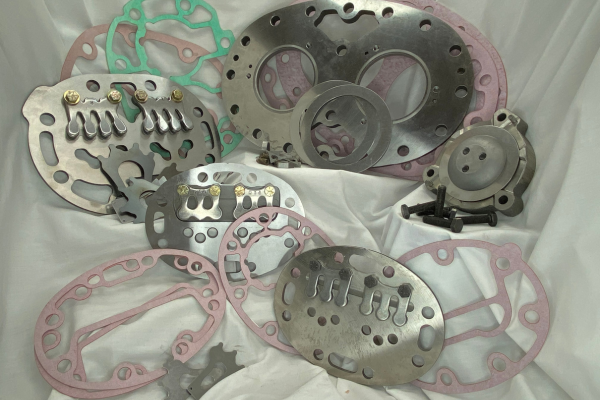Of all the components within a commercial HVAC or commercial refrigeration system, none are as important as the compressor. And within the compressor itself, there are various parts that all contribute to the performance you expect. Many of these parts are small, and some are not intended to be replaced.
Over time, commercial compressor designs have tended to offer fewer and fewer options for field repairs and replacements. However, there are some exceptions to this rule of thumb. You’ll always need to have the right commercial compressor components on hand, for example, when you need to replace an o-ring.
When looking at the various elements of the compressor, one that can fail unexpectedly is the valve assembly. Valve assemblies are the seals between the different pressure zones within the compressor. That allows for the proper flow of refrigerant from lower pressure regions to higher pressure ones.
As a result, any slight malformation or defect within the valve assembly can cause the entire compressor to stop working. The flow of refrigerant will be interrupted, which has a direct impact on the performance. Most of the time, there won’t be enough refrigerant flow to get any meaningful cooling, heating, or refrigeration.
There are several different types of valves that can be in a valve assembly, and all of them have slightly different performance and mechanical qualities. But no matter what type of valve you have, you certainly have the right valve plates for your assembly. And looking after those valve plates will extend the life of your compressor.
What Is the Valve Plate in a Compressor?
The valve plate in a compressor works with the suction valve to compress reduced pressure suction gas into highly pressurized discharge gas. Valve plates are designed to withstand many years of work under various operating conditions, including high temperatures and extremely low temperatures.
What Are the Signs of Valve Plate Failure in a Compressor?
You already know that a modern commercial compressor lasts for about ten years on average. With the right commercial compressor maintenance, it can be much longer – we have seen compressors operate for 20 or even 25 years. However, certain parts will need to be replaced after a while.
The valve plate is one of those parts. Even today’s most sophisticated commercial compressor designs will not protect the valve plate from all mechanical wear and tear over time. When the damage becomes too serious, refrigerant can push through the valve seals and cause erratic performance or make other parts fail.
Unfortunately, there are no distinctive symptoms of valve plate failure that other issues could not cause. Valve plates are most directly involved in maintaining the right levels of pressure within the system. Inadequate pressure could point to a valve plate problem.
Diagnosing Valve Plate Failure in a Commercial Compressor
Be sure to check your compressor’s pressure readings on a regular basis. Some compressors make this simple enough that it can be done in just a minute or two. Even so, make sure that checking compressor pressure readings is a regular part of your weekly commercial compressor maintenance routine.
What if you notice some unusual pressure readings? Remember that the most likely reason for bad pressure readings in a compressor is a lack of refrigerant. If refrigerant has run out faster than you expected, then the most likely reason is because of a leak in your refrigerant line.
Go through the standard procedure to check for a refrigerant line leak. You can use a leak detector or run a specialized dye through the system to pinpoint the source of the leak. If you rule out the possibility of a line leak, then the valve plate becomes a likely suspect.
How to Replace a Valve Plate in a Commercial Compressor
There are several steps to replace a valve plate in a commercial compressor, and they need to be done carefully in the right order. Done wrong, many of those steps can be dangerous to the compressor unit, with the possibility of a significant pressure build-up within a few minutes or even seconds.
Get detailed instructions for replacing a valve plate in a commercial compressor here: How to Replace a Valve Plate on Your Compressor.
Remember, a compressor valve plate isn’t meant to last nearly as long as the rest of the unit. It’s a good idea to make a visual inspection of the valve plate part of your monthly compressor maintenance checklist. If a valve plate failure leads to damage, you may need a commercial compressor replacement.
A remanufactured commercial compressor is your best investment when it’s time to replace a commercial compressor. You’ll get a unit that’s ready for another 8-10 years of reliable service at a significant discount. Procurement can take weeks instead of months, so you can minimize your downtime.












